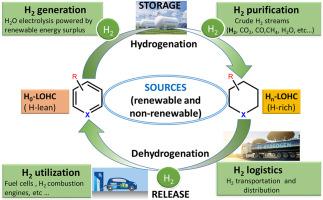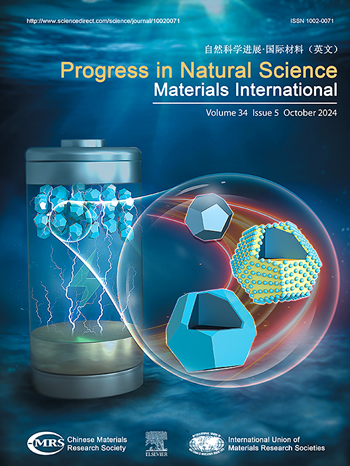Advancements in the development of liquid organic hydrogen carrier systems and their applications in the hydrogen economy
IF 4.8
2区 材料科学
Q2 MATERIALS SCIENCE, MULTIDISCIPLINARY
Progress in Natural Science: Materials International
Pub Date : 2024-10-01
DOI:10.1016/j.pnsc.2024.07.021
引用次数: 0
Abstract
The transition towards sustainable and clean energy systems has become a significant concern in the modern world. Hydrogen has the potential to meet the growing energy demands while addressing greenhouse gas emissions. However, one major obstacle in utilizing hydrogen as a fuel is the lack of efficient and cost-effective storage methods. In this regard, liquid organic hydrogen carriers (LOHCs) offer several advantages, including high hydrogen storage capacity, improved safety compared to traditional storage methods, and the ability to transport hydrogen using existing liquid fuels’ infrastructure. This review summarizes advancements in the development of LOHC systems for hydrogen storage, with a focus on the latest and innovative systems such as those based on dehydrogenative coupling reactions, renewable LOHCs from lignocellulosic biomass, and the development of LOHCs from plastic waste recycling. In addition to the material aspect, this contribution also discusses various applications of LOHCs in the broader context of the hydrogen economy, including a recently proposed concept of mixed gas hydrogenation of LOHCs for realizing hydrogen purification and storage in a single process step. By highlighting the main advantages and challenges of each LOHC system and providing future directions in the development of efficient LOHC systems, this review aims to contribute to an extensive understanding and advancement of LOHCs in the evolving hydrogen-based economy.

液态有机氢载体系统的开发进展及其在氢经济中的应用
向可持续和清洁能源系统过渡已成为当今世界的重大关切。氢有可能满足日益增长的能源需求,同时解决温室气体排放问题。然而,利用氢作为燃料的一个主要障碍是缺乏高效、经济的储存方法。在这方面,液态有机氢载体(LOHC)具有多项优势,包括储氢能力强、与传统储氢方法相比安全性更高,以及能够利用现有的液体燃料基础设施运输氢气。本综述总结了用于储氢的液态有机氢载体系统的开发进展,重点关注最新的创新系统,如基于脱氢偶联反应的系统、从木质纤维素生物质中提取的可再生液态有机氢载体,以及从塑料废物回收中提取的液态有机氢载体的开发。除了材料方面,这篇论文还讨论了 LOHC 在更广泛的氢经济背景下的各种应用,包括最近提出的 LOHC 混合气体氢化概念,以在单一工艺步骤中实现氢气纯化和储存。通过强调每种 LOHC 系统的主要优势和挑战,并提供高效 LOHC 系统的未来发展方向,本综述旨在促进对 LOHC 在不断发展的氢基经济中的广泛理解和进步。
本文章由计算机程序翻译,如有差异,请以英文原文为准。
求助全文
约1分钟内获得全文
求助全文
来源期刊
CiteScore
8.60
自引率
2.10%
发文量
2812
审稿时长
49 days
期刊介绍:
Progress in Natural Science: Materials International provides scientists and engineers throughout the world with a central vehicle for the exchange and dissemination of basic theoretical studies and applied research of advanced materials. The emphasis is placed on original research, both analytical and experimental, which is of permanent interest to engineers and scientists, covering all aspects of new materials and technologies, such as, energy and environmental materials; advanced structural materials; advanced transportation materials, functional and electronic materials; nano-scale and amorphous materials; health and biological materials; materials modeling and simulation; materials characterization; and so on. The latest research achievements and innovative papers in basic theoretical studies and applied research of material science will be carefully selected and promptly reported. Thus, the aim of this Journal is to serve the global materials science and technology community with the latest research findings.
As a service to readers, an international bibliography of recent publications in advanced materials is published bimonthly.

 求助内容:
求助内容: 应助结果提醒方式:
应助结果提醒方式:


